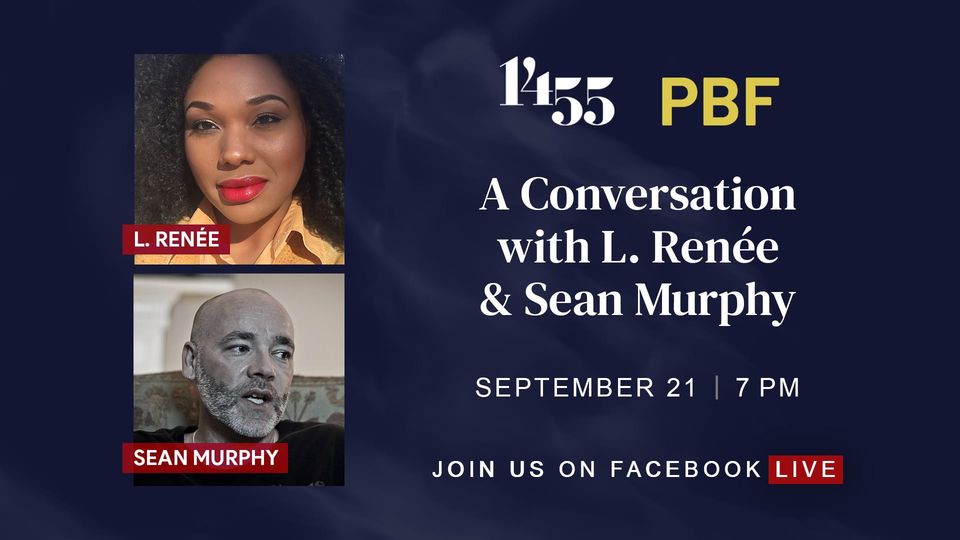
Tuesday night featured the first of what I anticipate to be a vibrant, ongoing collaboration: it’s my pleasure and honor, as the Executive Director of 1455, to partner with the amazing Peter Bullough Foundation, located in Winchester VA, to present programming. Our first event is a celebration of their recent poet in residence, L. Renée.
The Peter Bullough Foundation believes in supporting emerging artists and the arts through an interdisciplinary artist residency and through sharing the collection of Dr. Peter Bullough. Post-Covid, the Foundation plans to host events and gallery showings throughout the year. (Find out more and support them at https://www.peterbulloughfoundation.org/.)
The focus of this conversation was L.’s current, very ambitious project, And The Dust Still Sings: Black Appalachian Inheritances.
Artist statement: My interdisciplinary book project entitled, “And the Dust Still Sings: Black Appalachian Inheritances,” documents and transmits the experiences of my maternal ancestors from the tobacco fields of Southwest Virginia to the coal mines of Southern West Virginia during the nineteenth and twentieth centuries. My work fuses both the creative and various modes of the historical to reveal what is held by and missing from traditional archives. Composed of poems, prose documenting my discoveries, photographs, and family artifacts, my book engages with literary and visual practices to render visible the often unacknowledged narratives and passed-down legacies of Black Appalachians.
I situate myself as a speaker collecting oral histories from relatives, interrogating the politics of memory, highlighting generational patterns, and conducting genealogical research to answer two complex questions: What have I inherited from my family who migrated north with the hopes of attaining a better life? And what of these inheritances are in service of or in disservice of my needs to be a Free Black woman living in the U.S. today?
My work probes Black identity, womanhood, lineage, the body, trauma, landscape, migration, abandonment, and food culture. I examine how the characters in my poems and prose are nourished through prayer, relationships, and the fruits of their labor. This, too, goes back to the body—how it is a home for our sacrificial acts, for our needs, pleasures, and griefs.
(Editorial note: I was delighted to have the opportunity to see/hear this extraordinary poet read “Fish Fry,” which happens to be the first work of hers I read. To get a taste, pun intended, of her style, the poem is below, followed by a bio and the complete video of our event. Enjoy and spread the word!)
Fish Fry
Everything delicious is served on Friday.
Jesus should get a do-over for the Last Supper,
since He missed out on the miracle
that is Wonder Bread made paste by perch’s
corn-mealed skin sweating Crisco, clinging
like faith to a mouth’s roof, even as the tongue
tries to negotiate release, swat freedom for teeth.
We know what delay tastes like.
We have waited for a check that affords us
this feast of fish golden crisp and the glow of black joy.
With Luther Vandross praising us for being bad
on Aunt Mary’s 45 spinner, who would call this dinner?
Stove tops bubble with pots of kale and collards
made sides only by smoked ham hock oozing
salty fat, their doneness determined by Mama Joyce
who dips her Too Blessed 2 Be Stressed mug in the pot-
liquor and sips slowly, purses her lush lips and declares:
It got more meldin’ to do. Ain’t that true for all of us?
She snorts every time Lil’ Russell comes by to kiss her highest
cheekbone, his jeans drifting toward hell like he forgot
his real tribe. Nevermind, no matter, we made it here together
the Old Timers will say — though they suck their teeth at the sight
of his drawers, at the sight of a Reneger at their Bid Whist table,
at the scent of Dee Dee’s too-sweet macaroni and cheese.
We all fall short of perfection like memory, but Uncle Harold
brings us back to where we started: yellow perch biting their ashen
end of a line in Lake Erie’s Ohio waters — the place Grandaddy,
wearing his old mining boots, taught generations the patience
needed to stay fed. Uncle Harold will never bring the tartar sauce
Cousin Cathy, out East, developed a taste for. He will fling back his
James Brown-slicked bouffanted crown and howl the sound of hunting
hounds choking on coal dust, remind her she still a West Virginia holler
girl, remind us travels ain’t useful without this knowing.
*This poem originally published by the Appalachian Review.

L. Renée is a poet and nonfiction writer from Columbus, Ohio. She holds an MFA in Poetry from Indiana University, where she served as Nonfiction Editor of Indiana Review and Associate Director of the Indiana University Writers’ Conference, and a MS in Journalism from Columbia University, where she was a Joseph Pulitzer II and Edith Moore Fellow. Her work, nominated for Best New Poets and a Pushcart Prize, has been anthologized and published in a variety of publications. As mentioned, she was a recent resident of The Peter Bullough Foundation for the Arts. She believes in Black joy, which she occasionally expresses on Instagram @lreneepoems

